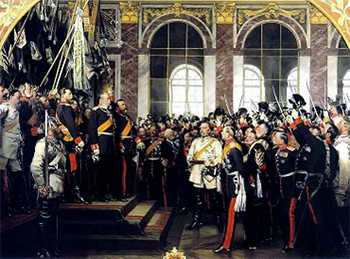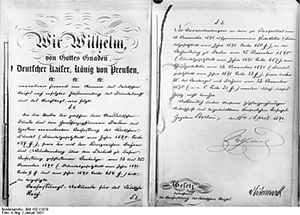The German Imperial Government
The government of the German Empire consisted of various elements, each with varied responsibilities. At the top was the Kaiser, or emperor. Advising him were an array of elected and appointed officials. All of that was delineated in a Constitution. 
The numerous German states had banded together in a number of ways for centuries. After a number of wars and political maneuverings, they all came together, in 1870, the last unifying factor being a rallying cry to join forces to defeat France. The result of that conflict was a decisive win for Prussia, the largest German state, and then the unification of Germany. On Jan. 18, 1871, King Wilhelm I was proclaimed Kaiser Wilhelm I of the new German Empire. 
The Constitution of the German Empire came into effect on May 4 of that year. The empire was officially a federation, with the King of Prussia the emperor and permanent president. Through the entirety of the empire, only Wilhelm I and his son, Wilhelm II, served as emperor, or Kaiser. Second in command was the emperor-appointed Chancellor. In all, eight men served as Imperial Chancellor, the first and most famous being Otto von Bismarck. In turn, the Chancellor was the head of the Bundesrat, a council of representatives of the various German states. The lone legislative element of the government was the Reichstag, a body of nearly 400 representatives elected by German males who were 25 or older. (Suffrage was universal as long as that word was restricted to men.) In addition, voting was done in secret and, if necessary, in two stages: If any candidate did not receive a majority of the vote, then the two candidates who received the most votes progressed to a runoff election. Members of both the Bundesrat and the Reichstag had voting power. The Bundesrat nominally functioned as an upper house, in parliamentary terms, and had 58 votes in total. Prussia, as the most powerful German state, had the most votes, 17. Next was Bavaria, with 6. Both Saxony and Wüurttemberg had 4; both Baden and Hesse had 3; both Mecklenburg-Schwerin and Brunswick had 2. Having just one vote were 17 other small states. After 1911, Alsace-Lorraine had 3 votes, bringing the total to 61. If a proposed law affected a certain state, only members from that state could vote on that. Presiding over all Bundesrat business was the Chancellor, who could cast the deciding vote if the tallies somehow ended in a tie. Otherwise, a simple majority was enough to pass a law. 
The Reichstag, too, passed laws by simple majority. That body had many more members, 382 in all (397 in 1874), one of whom was the President, who presided over that body's business. In all, 14 men served as President of the Reichstag. As with the Bundesrat, Prussia dominated the Reichstag, having 235 members. The next-most powerful state in these terms was Bavaria, with 48. Saxony had 23, Wüurttemberg had 17, Baden had 14, Hesse had 9, Mecklenburg-Schwerin had 6, Saxe-Weimar had 5, and various other states had a vote each. Later came with Alsace-Lorraine, with 15. Both legislative bodies functioned at the behest of the emperor, who issued an annual call for them to gather. The term of office for the Reichstag was three years as set out in the constitution; a change to five years came in 1888. The vast majority of the members of the Reichstag were also members of a number of political parties. Logistically, the emperor originated legislation, which had to be approved by both lawmaking bodies. The Bundesrat got first crack at most laws, but the Reichstag had special power to allocate money and to approve treaties. Over and above this, however, the Bundesrat had the power to dissolve the Reichstag–with the permission of the emperor, of course. Because Reichstag approval was needed for all laws, the refusal of that body to pass a law was seen several times as holding up progress and the emperor and Bundesrat declared the Reichstag invalid and its membership void, giving way to new elections. |
|
Social Studies for Kids
copyright 2002–2026
David White




